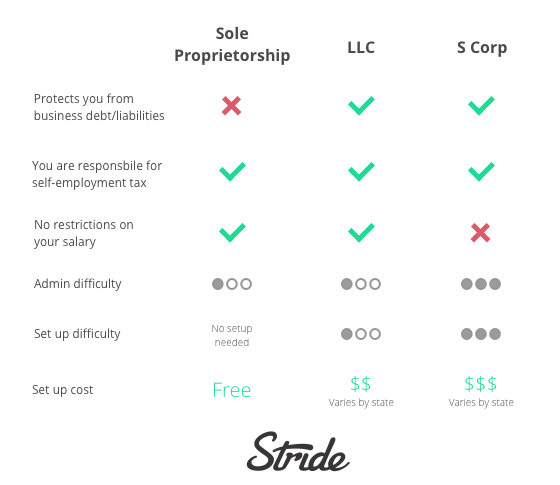S Corp vs LLC: Should you incorporate?
As a self-employed person, it may be a good idea to form a formal entity for your business (such as an LLC or an S Corp). They can help you limit your liability as well as give you tax advantages. There are five different types of entities, but we've narrowed down the list to three common types for self-employed people, to get you started.
Learn the major differences between three popular options and check with an attorney and tax professional when deciding the best option for you:
Sole Proprietorship
If you haven’t completed any paperwork, you’re probably running your self-employed business as a sole proprietorship. A sole proprietorship is simple, but it does not protect you from personal liability or the debt collector. Even still, a sole proprietorship may be the the right choice for you if you like ease of operations, do not expect your business to grow, and have no business debt.
Remember, you'll need to report your business income on a Schedule C at tax time, but individual states usually do not have a special form for your business income.
Advantages
- Tax filing is less complex, compared to an S Corp vs LLC.
- No action is needed in order to form a sole proprietorship, but you may need to register your business with the local government .
- A sole proprietorship is automatically given to you-- as long as you are the only owner of the business.
Disadvantages
- No protection against personal liability
- No distinction between the business and the owner
- You are solely responsible for business debts, losses, liabilities, etc.
Limited Liability Corporation (LLC)
A Limited Liability Corporation (LLC) is a very popular option with the self-employed. LLCs have fewer formalities compared to a C Corp or S Corp. They get many of the benefits of a corporation along with the ease of a sole proprietorship. LLCs offer protection from business liabilities, but they are less complex to set up than S Corps and do not place the caps on "reasonable salary" that you must follow with an S Corp. Set up is straightforward. You’ll just need to complete a form and pay a minimal charge to the Department of Financial Institutions in your state.
Advantages
- Protects your personal assets from creditors
- Avoids paying both personal and business taxes on your income
- Income and expenses related to your LLC get reported on your personal tax return, as you’re the owner and operator of the business.
- When you have business debt, an LLC is more flexible than an S Corp
- Less expensive than S Corp to set up
Disadvantages
- You cannot issue yourself a W-2 with an LLC (assuming your LLC is taxed as a partnership or disregarded entity and you are the sole member)
S Corp
An S Corp is the most complex of the three most popular entities for self-employed people. However, the pros may outweigh the cons for you, if you are a high earner or plan to transfer ownership of the business. Generally speaking, the most attractive benefit of an S Corp vs LLC is the ability to pay yourself via a W-2.
Advantages
- Protects your personal assets from creditors
- Avoids paying both personal and business taxes on your income
- Lets you set up payroll and withhold taxes and FICA from earnings
Disadvantages
- You must be a U.S. resident or citizen
- Have only one class of stock
- Have no more than 100 shareholders and distribute profits and losses to shareholders in proportion to their ownership percentage
- It’s expensive. Tax professionals suggest you only set up an S Corp vs LLC if you plan to make over $150,000 per year.
- Taxes are complicated. You’ll need a CPA to handle your tax prep and deductions.
- Depending on your state, you may have to pay state taxes for the corporation
Stride tip: When forming any business entity, remember to keep the business operations separate from your personal transactions and accounts. Open a separate bank account for your business to keep things straight. Courts like to see business entities operating separately from personal finances to respect limited liability protections.
Understand your freelance taxes with Stride
No matter how you run your self-employed business, you should keep track of the tax deductions related to your freelance business. Check out the tax section of your dashboard to discover ways to save big on taxes in 2017.

